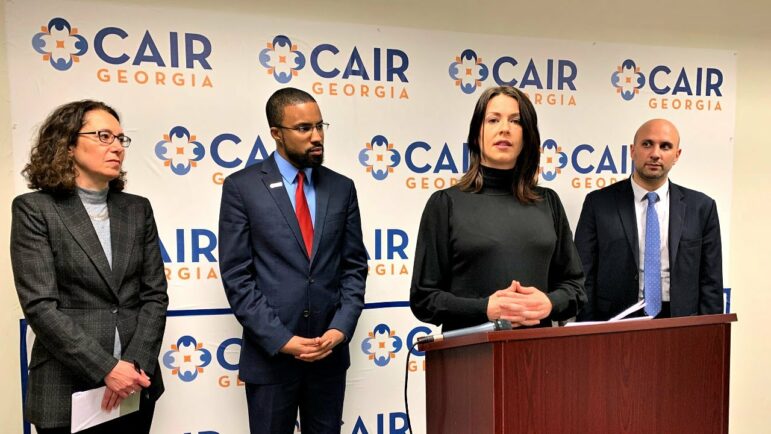Background
The PCJF and the Council on American-Islamic Relations (CAIR) represented journalist and filmmaker Abby Martin in the case of Martin v. Wrigley, a federal free speech lawsuit challenging Georgia’s anti-BDS law as unconstitutional.
In 2016, Georgia passed a law requiring any person or company entering into a contract with the state that was worth $1,000 or more to sign an oath pledging they would not participate in any boycott of Israel. Numerous advocacy groups and state legislators, including then-House Minority Leader Stacey Abrams, opposed the law as a violation of free speech.
The law at issue was part of an effort to block the growing Boycott, Divestment, and Sanctions (BDS) movement. Modeled after the global South African anti-apartheid movement, the BDS movement’s stated goal is a peaceful political campaign to pressure the Israeli government to end its occupation of Palestinian territory. More than 35 states have enacted measures to restrict participation in the BDS movement.
J Street and T’ruah, the rabbinical human rights group, filed a brief supporting the challenge to the law, recognizing the profound danger it poses to First Amendment rights.
Ruling in favor of PCJF’s client, federal District Court Judge Mark Cohen wrote that this loyalty oath “discriminates based on the motive for engaging in a boycott against Israel … [and] is no different than requiring a person to espouse certain political beliefs or to engage in certain political associations.”
In 1956, Martin Luther King, Jr. was criminalized for leading a boycott against Jim Crow apartheid in Alabama. Southern states enforced anti-boycott laws to punish and derail civil rights organizing.
Economic boycotts for the purposes of bringing about political change are entrenched in American history, beginning with colonial boycotts on British tea. Later, the Civil Rights Movement relied heavily on boycotts to combat racism and spur societal change. Cesar Chavez led the United Farm Workers grape boycott, that from 1965-1970 brought millions of Americans together to support agricultural workers and ultimately won better working conditions and labor recognition. The Supreme Court has recognized that non-violent boycotts intended to advance civil rights constitute “form[s] of speech or conduct that [are] ordinarily entitled to protection under the First and Fourteenth Amendments.” NAACP v. Claiborne Hardware Co., 458 U.S. 886 (1982).
The lawsuit was filed against the University System of Georgia, which cancelled Martin’s campus speaking event when she refused to sign the state-mandated oath. Martin, the director of the award-winning 2019 documentary, “Gaza Fights for Freedom,” had been invited to speak at an academic event about “media literacy.”
After the ruling from the federal court was issued, the Georgia state legislature worked to avoid any further adjudication in the lawsuit brought by Martin, to render the lawsuit moot by revising the law to limit its application to contracts worth more than $100,000 that are made with companies that have five or more employees, a category to which Martin did not belong. The legislature made no changes to the discriminatory provisions of the law that are unconstitutional and as such the unconstitutional law remains on the books until challenged by a large contractor.
Legal Information
Martin v. Wrigley et al., United States District Court of Georgia North Division | Case No. 1:20-cv-00596-MHC
Martin (Georgia Anti-Boycott) – Complaint 2020
Martin (Georgia Anti-Boycott) – Amended Complaint 2020
Martin (Georgia Anti-Boycott) – Plaintiff Opposition to Defendants’ Motion for Summary Judgment
Martin (Georgia Anti-Boycott) – Amicus Brief of J’Ruah and J Street 2020
Martin (Georgia Anti-Boycott) – Court Order 2021
PCJF News
Major Free Speech Win by PCJF and CAIR: Court Rules Georgia’s Anti-BDS Law is Unconstitutional

